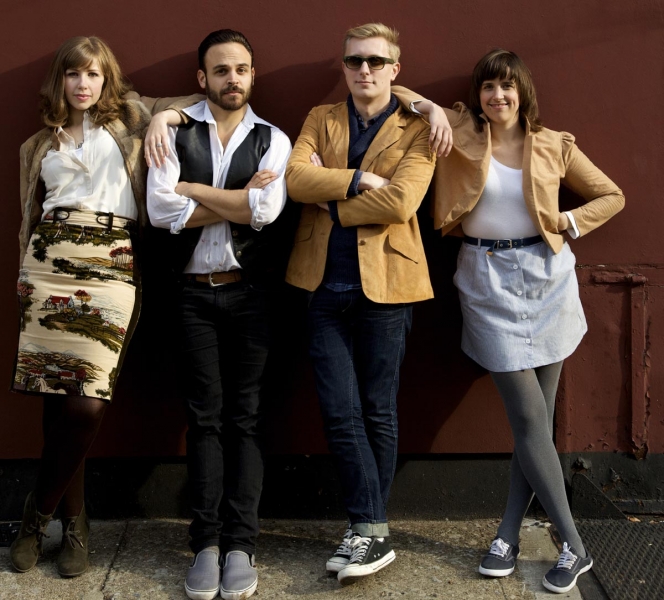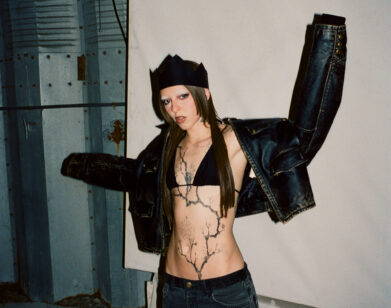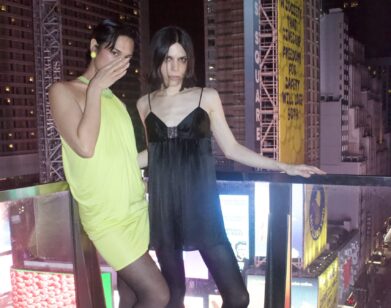Lake Street Dive’s Selfie Regard

ABOVE: LAKE STREET DIVE
Few bands can claim to have as meteoric a rise as Lake Street Dive. Since their soulful rendition of the Jackson 5’s “I Want You Back” went viral last year, the classically trained quartet released a full-length sophomore LP, Bad Self Portraits, they’ve shared the stage with Patti Smith—at the coercion of T-Bone Burnett, no less—and they’ve performed on Ellen, Conan, The Colbert Report, and the Late Show with David Letterman.
Producing an irresistible blend of alt-country, jazz, ’60s Motown and Stax R&B, the members of Lake Street Dive—named after a neighborhood of Minneapolis dive bars—have as much appeal as they do talent. Vocalist Rachael Price is some kind of American response to the late Amy Winehouse. Though she lacks the emotional instability of the troubled crooner, rare is it to find a voice so effortlessly rich and reminiscent of decades past. And still, Price does not overshadow the quartet’s instrumentalists. Trumpet/guitar player Mike Olson, stand-up bassist Bridget Kearney, and drummer Mike Calabrese match Price’s prowess mark for mark.
In light of their two sold-out shows at Bowery Ballroom this Monday, March 31 and Tuesday, April 1, we spoke with Lake Street’s Calabrese about emulating legendary percussionists like Mitch Mitchell, Ringo Starr, and Charlie Watts, writing love songs in our selfie-obsessed age, and maintaining a dive bar vibe in the midst of sold-out crowds. Lake Street’s two-night New York stint is particularly special, as they are sharing the stage with keyboardist and Bad Self Portraits producer Sam Kassirer of Great North Sound Society.
BENJAMIN LINDSAY: One of the first things I noticed about Lake Street Dive was the acronym, LSD. I know it’s silly, but was that at all intentional? Your music is inspired by the ’60s, LSD was popularized in the ’60s—other than that, it doesn’t seem to play a role in your music.
MICHAEL CALABRESE: No, no, not at all. In fact, it took us about four years to realize that that was the acronym because we are an incredibly innocent, boring group of nerds.
LINDSAY: Your shot to fame over these past few months has been nothing short of amazing. How do you four stay grounded through it all?
CALABRESE: Part of it is just how busy we are. There’s not a lot of time to really sit back undistracted and think about what’s happening to us. We’re just kind of grinding it out as we always have; it’s just become more evident that instead of grinding it out in a bar, we’re grinding it out in David Letterman’s studio. It’s still the same four people that we’ve been friends with for 10 years, and we play songs that we’re incredibly familiar with and we’re also performing. We’re used to that world, and we’re used to working really hard, so it’s just been a matter of making sure that we keep doing what we’ve always done. I don’t know what’s gonna happen when we have a lot of time on our hands, we might freak out, but I doubt it. We’re just enjoying every moment.
LINDSAY: Your sound has been praised as this sort of fusion of ’60s R&B/soul with contemporary pop, some dashes of jazz. In deciding to perfect that sound, was it a matter of you trying to tap into pop music and younger audiences, or this is just kind of where your creative juices took you?
CALABRESE: In terms of modern pop—I assume you’re talking about Bieber and Taylor Swift—we honestly don’t pay attention to that stuff. Really, all we focus on is writing songs that remind us of the songs that we love to listen to. That’s become the craft. That just so happens to be a lot of ’60s stuff, like you said, but we are influenced by a lot of modern music, as well. Everything finds its way in. It’s our contemporary sensibilities that maybe keep it in that more modern-sounding vein instead of us going for the complete revivalist, recreationist vibe while recording.
LINDSAY: It’s not so much a impersonation or duplication of things that have come before you, it’s a progression.
CALABRESE: Yeah, exactly, and it’s all based on the songs. As a band, you just want to make the song sound the best it can.
LINDSAY: What kind of themes interest you as a songwriter?
CALABRESE: It’s a lot of love, of course, because that’s just sort of the standard, traditional pop music thing. But I guess the twist on it is, you know, I was listening today to that Ray Charles tune—”I got a woman uptown who’s good to me,” you know? It’s a love song, but as he talks about it, she knows a woman’s place is in her home and blah, blah blah. A lot of music from that era is this very overwrought, romantic, sometimes misogynistic sort of love. I think just being the generation we are, we sort of experience love in a—I wouldn’t say it’s a new way of experiencing love, but it’s a new context, for sure. I think we’re all trying to write the love songs that we haven’t heard. For instance, Bridget’s song, “Bad Self Portraits,” sort of exemplifies that perfectly because it’s a world of taking selfies and sort of showing the world that you’re doing stuff but feeling alone inside. We’re trying to twist it around in that way, I guess.
LINDSAY: I hope you don’t mind me asking, but has either of the four of you ever been romantically involved, or has it always been a professional, platonic relationship?
CALABRESE: I thought you might ask that question. No, no, that was actually the first rule of the band: none of us are dating, or have ever dated, or have ever really considered it. Our friendship developed so quickly and the fun of the creativity together developed so quickly that it never was an option on the table, and we really couldn’t be more thankful for that. We all love and respect each other, but it’s within a certain framework, and I think we’re all glad for that reason because we don’t wanna end up like Fleetwood Mac or the Mamas & the Papas.
LINDSAY: Who made you laugh more: Ellen or Stephen?
CALABRESE: I think just by virtue of the fact that we got to do an interview on Colbert, that was definitely super funny, and we laughed a lot with him on stage and backstage ‘cause he came back to meet us and stuff. We really didn’t get to meet [Ellen], but the show’s funny; she’s incredible, really.
LINDSAY: With Another Day, Another Time, how did T-Bone Burnett originally approach you guys?
CALABRESE: Gabe Witcher is the fiddler in the band The Punch Brothers. We’ve opened for The Punch Brothers and seen them at a lot of the same festivals and we’re friends with those guys, and Gabe and T-Bone work on a lot of projects together, and it was Gabe who showed him the stuff to begin with. I guess after he saw a couple videos, T-Bone was, like, “Hey, I like these guys,” and decided to bring us out.
LINDSAY: What was it like sharing the stage with such legends?
CALABRESE: It was very, very surreal, and we were super excited and nervous to meet these people, but after spending time with any of them, we were quick to realize that they were just all great folks. I don’t think T-Bone Burnett really surrounds himself with anybody who’s not focused on music and also just a nice person to boot. Even some of our heroes, you know, or some of our parents’ heroes, even—Joan Baez and Elvis Costello—we were actually able to talk one-on-one with them about things. We were sharing a moment with another human being as opposed to this big star. That was so grounding for us.
LINDSAY: You’re graduates of New England Conservatory—how did Boston influence your music, if at all?
CALABRESE: Boston is a very unique place, and it’s a great place for music support. There are a bunch of great venues and lots of people who wanna come out and see it. It seems like a very focused, loyal scene. It’s that spirit that we entered into when we first started playing bars and stuff like that. Even in folk clubs like Passim, they’re a folk club, but they’re open-minded enough to be, like, “These are Boston people who got their start in Boston playing music, so we’re going to support that.” It was really the community of people who like putting music on and the people going to see music that was so strong in that town.
LINDSAY: You’ve been playing to sold-out audiences across the country. How do you keep your dive bar mentality as you’re selling out the Bowery Ballroom?
CALABRESE: A place like the Bowery Ballroom is our perfect venue because it’s got a couple layers, but it’s definitely got a dance floor, a standing room, and we want people to feel free to dance or get rowdy if they want to. But also in a dive bar, if people are willing to go there with you, you can really bring it in and get intimate with people. That’s sort of the vibe: not only get rowdy and have fun, but have it feel like everybody—including the band—we’re all in this thing together. We’re in this small space and can all smell the same smells and feel the same way and have a shared experience.
BAD SELF PORTRAITS IS OUT NOW. CATCH LAKE STREET DIVE THIS MONDAY, MARCH 31 AND TUESDAY, APRIL 1 AT BOWERY BALLROOM. FOR MORE INFORMATION ON THE BAND, VISIT ITS WEBSITE.






